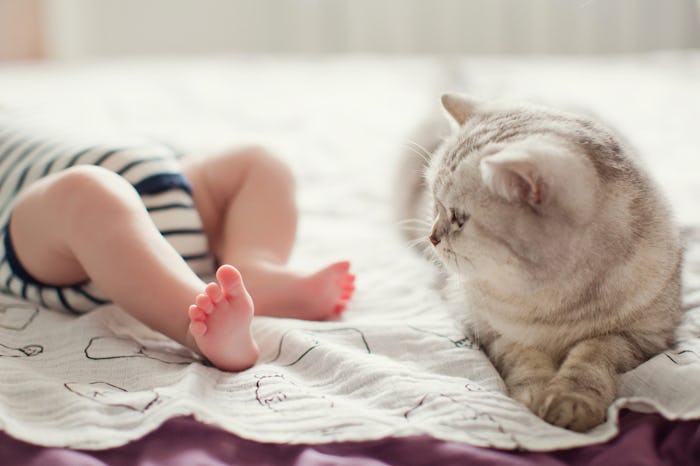Life

Here's Why Your Cat Is Obsessed With Sleeping Next To Your Baby
Cats believe they rule the world. They’re some of the most intelligent, yet machiavellian creatures on Earth, and we love them. They seem to love us, too — on most days anyway, when they feel like we are worthy. But if you’re bringing a baby home to your cats, you may be scared they’ll try to smother your kid in their sleep. For whatever reason, many cats suddenly want to be wherever the baby is. But why do cats sleep with babies? And how much do you need to worry?
Much like the reasoning behind why dogs want to sleep with your baby, “there is not much difference between social species and their desire to commune with and to share their lives with their family members,” Los Angeles-based certified dog and cat behaviorist and trainer Russell Hartstein tells Romper. “Like all sentient beings, cats have feelings, and oftentimes express those feelings by wanting to smell, touch, taste, listen to, and see their family.” Well how about that?
And while most of us love to sleep with our cats — unless they’re like my cats and enjoy laying on your head and face or sitting on your chest and staring at you until you give them food — cats love to sleep next to us, too, according to Hartstein. “It’s a mutually symbiotic relationship, which is why cats have been living with humans for millennia,” he explains.
Plus, cats are just so dang curious — as if you couldn’t tell that already when you’re trying to make the bed or have an open box from a package that was just delivered. “Children are new, different, and interesting. From all aspects — sound, smell, movement, chemicals, emotions — your cat is a curious being and wants to explore and be around love. Just as we do,” Hartstein says. And as far as cats just wanting to be near something warm, like a baby, Hartstein says that could be a factor, but it’s actually more than likely due to a cat's powerful olfactory (nasal) glands.
But even though it’s totally adorable and a good thing that your cat isn’t jealous of the baby, Hartstein says, “As with all animals, for the safety of both species, it is never recommended to leave them alone together. Always have a parent supervise interactions of a child and a cat.” Having issues keeping your cats out of your baby’s crib or bassinet, or nursery in general? Most people can just close the door, but our house was built in 1920, so the door is a little off-center and won’t close all the way. So I asked Hartstein if we could train our cats to not bust into the baby's room when we're trying to put him down for bed or a nap, and if we can keep them out of the crib.
If you're in the same conundrum, training a cat is possible, according to Hartstein. “Training a cat to do something is the same as a dog. We don’t focus on what we do not want the cat to do, but instead focus on what behaviors we want them to do. For example, instead of going into the crib or bassinet, you could reward your cat heavily for going to their own bed or place. It can be close to or far away from the baby’s room. You’ll have to experiment with what works best for each individual. Then work on duration, having your cat stay in their comfortable place for longer and longer period of time. Soon your cat will choose to go to their bed or place more often because that’s where wonderful rewards happen. Conditioning!”
So it seems like cats really do love you and other people — they just like to pretend they don't to establish their dominance of the household. They love the brand new family member as much as you do, and want to be close to them and snuggle — just be sure to keep an eye on them. You can't have the cat teaching baby bad manners, like how to take over the world.